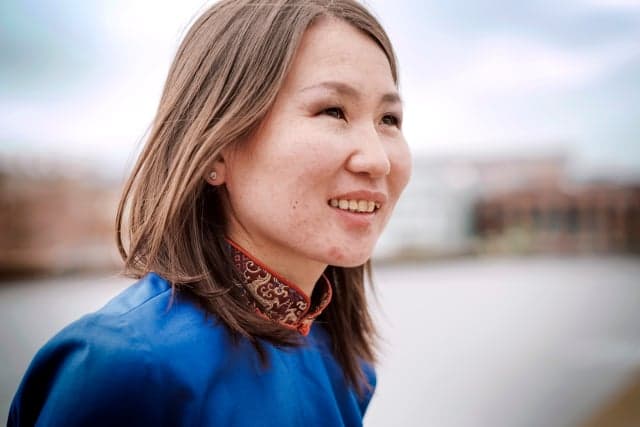Mongolia to Malmö and back: one nomad’s tale
Malmö may be a long way from the steppes of Mongolia, but recent Malmö University graduate Chantsalnyam Luvsandorj, found herself inspired by both places.

Born in the Gobi Desert into a nomadic family, she didn’t know what a city was until the age of twelve and didn’t handle money until she was 15. Now Chantsalnyam Luvsandorj has graduated from Malmö University armed with an education to head back and help her native Mongolia.
On the eve of her recent graduation ceremony, Chantsalnyam recounts her remarkable tale of growing up in the extremes of Asia’s largest desert and explains how the rapid onset of globalisation led her to seek out an education in Sweden.
The youngest of four children in a family that herded camels, sheep, goats and horses – Chantsalnyam and her siblings had to help out as soon as they were physically capable of doing so. It was a lifestyle that would lead her to where she is now, a graduate of the Leadership for Sustainability Master’s Programme.
“My childhood was spent surrounded by nature and the animals. As children, we were very autonomous because our parents were busy with work. Looking after animals is an endless job, there are no days off,” she explains.
Living in a yurt
By the age of five, Chantsalnyam was looking after baby animals and soon after was riding both horses and camels. She left her family at the age of eight to start school 60 kilometres away from where her family kept their herds.
“We went to the nearest village where there is a school and minimum infrastructure. It was me and my older brother who was nine and my older sister who was 14. We lived by ourselves in a small yurt for a term at a time,” she recalls.
“We took all our combustibles that we needed to cook and stay warm and were given all the meat and flour we needed to last us. We had no contact with our parents, they didn’t know if we were okay and we didn’t know if they were okay. All we knew is that daddy would be there on the last day of school to pick us up.”
More about Leadership for Sustainability at Malmö University
With temperatures dropping to -30 degrees C, Chantsalnyam and her siblings fetched water from a well and lived off the stored food. Keen to further her studies and excel, she eventually went to university to study linguistics.
“I knew how hard it was for our parents to be separated from their children so from a very young age I knew I wanted to study because I didn’t want my kids to be separated from me like I was from my parents,” she says.
Scholarships and sustainability
Having learned Russian and French, she found work with a French NGO based in Mongolia.
“I was good at languages. I started learning French without even knowing what France is! I knew there was a country called France, but nothing really else,” Chantsalnyam quips.
“With the French NGO, I was in contact with lots of people from around the world and when I really realised the importance of nature, I started looking at it differently. I became aware of all the waste problems. Waste was new to the culture because we were used to dealing with only organic waste; but with globalisation, we had all of these products. With that came plastic bags and packaging and people were not used to it, so it is just got dropped into wild nature.”
Read more Malmö University stories on The Local
Inspired to take action, she applied to Malmö University with a Swedish Institute Scholarship to study sustainability more in-depth. By then, she was married with two children, but with her nomadic background, it was no big deal to move the entire family to Sweden for a year.
“It was an interesting topic for me, it spoke to me somehow and Sweden has a good reputation when it comes to sustainability,” she explains.
'I want to do everything'
While many people simply equate sustainability with the environment, Chantsalnyam quickly discovered that her programme at Malmö was “more than just that one dimension”.
“It covers a broader idea of sustainability, it involves how you can deal with the private sector, government organisations, social enterprises – it is very diverse,” she explains.
 Chantsalnyam at home in Mongolia with one of her camels. Photo: Private
Chantsalnyam at home in Mongolia with one of her camels. Photo: Private
“Now I feel I have too many things to do in Mongolia, and I don’t know where to start! I have to choose – I want to do everything!”
Following her time at Malmö University, Chantsalnyam says she’s returning to her home country “inspired to be less passive”.
“I want to be more involved in working with youth, the future of the country,” she explains.
Chantsalnyam also hopes her country learns to be more self-reliant rather than having to “beg for money” from international donors.
“From this nomadic culture, we have this high capacity of adaptation and openness,” she adds.
And on that note, Chantsalnyam’s husband and two children arrive to witness her graduation ceremony. The following week they plan to travel to Belgium, and then onwards to France before their return to Mongolia.
Once a nomad, always a nomad.
Find out more about studying in Malmö
This article was sponsored by Malmö University.
This content was paid for by an advertiser and produced by The Local's Creative Studio.

Join the conversation in our comments section below. Share your own views and experience and if you have a question or suggestion for our journalists then email us at [email protected].
Please keep comments civil, constructive and on topic – and make sure to read our terms of use before getting involved.
Please log in here to leave a comment.